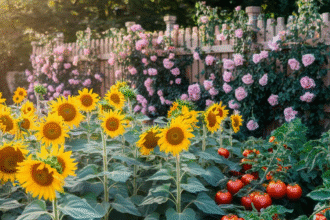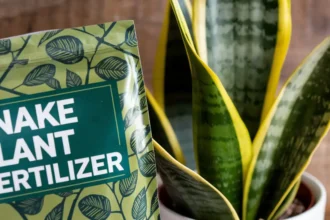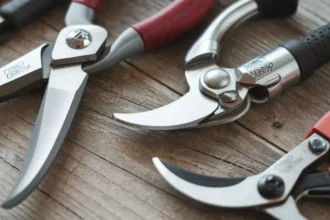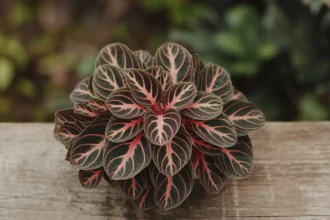Are you looking for the best garden mulch for your vegetable plants? This post is for you!
Every expert gardener knows the importance of mulching. However, there are so many types of mulches to choose from, with a variety of uses in the garden. Literally, anything can be packaged and labeled mulch.
Whether you want to beautify your vegetable garden bed or prevent weeds, follow this guide to choose the best types of mulch for your garden.
Please note that mulch used for vegetable beds is different from those used in a pathway or shrub garden. This post focuses mainly on mulch for vegetable gardens.
What Is Garden Mulch?
Every gardener has heard of mulch. But what exactly is mulch?
Mulch is an essential gardening supplement. It is a material that is laid to cover the surface of the soil.
There are two basic types of mulches – organic (natural plant-based) materials like compost, tree bark, grass clippings, leaves, or manure; and inorganic materials like plastic, fibre, stone, or gravel.
Why Is Mulching Important To Your Garden?

Mulching holds a lot of benefits, which include the following:
- It helps retain soil moisture by reducing evaporation, helping to reduce water loss.
- It inhibits and suppresses the germination of weeds by keeping light and moisture away from weed seeds.
- It protects the plant root zone from extreme cold and heat through insulation.
- It helps to control erosion by stemming water runoff.
Other benefits of mulching include:
- Organic mulch helps to reduce soil compaction, improves soil health and structure, aids drainage, and adds nutrients to the soil.
- It prevents plants from being pulled out of the garden soil during the winter cold, freeze-thaw cycles.
- It aids percolation, allowing nutrients and water to penetrate easily into the soil.
- It prevents a hard crust from forming on the top of the soil.
- Finally, some mulches are decorative; using them enhances the beauty of your garden.
Types Of Mulch Materials

Before we delve into the best garden mulch for your vegetable garden, it is important to consider the most commonly used garden mulches, as different types of mulch suit different gardening purposes.
Here are some of the most common garden mulches:
Organic mulches
These are natural plant-based materials. They are biodegradable. That means with time, these materials can break down and decompose to improve the soil structure, enrich the soil, and nourish plants.
Shredded bark: This is the most common type of mulch. It is readily available and cheaper than other types of mulch.
Just as the name suggests, shredded bark mulch is made of different wood byproducts, which include tree barks shredded into fine pieces. This decorative mulch is resilient to water runoff and suitable for use along slopes.
As time goes on, shredded bark feeds your soil as it breaks down gradually. Hence, you should replenish it every 1 to 2 years. Shredded bark is suitable for use in beds around shrubs and trees.
Wood chips mulch: These are made from stumps, branches, and other wood wastes cut into small chunks. Wood chips are coarser than shredded bark and come in different sizes.
They are a good alternative to shredded bark and are also suitable for shrubs.
Straw mulch: Straw mulch is obtained from the stalks of grain crops like rye, oats, and wheat. They make a beautiful addition to your garden, thanks to their beautiful golden color. Straw helps to keep mud off from around your plants.
Compost mulch: These are grass clippings, leaves, roots, and other organic materials that have decomposed. They look like soil but darker.
Compost helps to improve drainage and soil structure. It also adds nutrients to the soil. It is often mixed with the garden soil as an amendment. However, it can also be used as a top dressing in raised garden beds or pots.
There are different types of compost mulch, such as manure-based, leaf mold, worm castings, mushrooms, and all-purpose compost.
Manure: This is made from animal waste. It is very rich in nutrients and organic matters, and helps to improve soil structure and drainage.
You can use manure to mulch garden beds and vegetable plots or as a soil amendment.
Other organic mulches are:
- Grass clippings
- Leaves (leave molds)
- Pine needles
- Cardboard
- Cocoa bean shells
- Hazelnut shells
- Sawdust, and
- Ground cover plants
While some organic mulches are readily available in your garden for free, you can buy some from reputable sources. If you wish to get yours from a garden store, avoid using mulches treated with chemical herbicides or pesticides on edible crops.
Inorganic Mulches
These are made from inert, sometimes non-biodegradable, materials. They last longer than organic mulches and could be more expensive.
Some common types of inorganic mulches include:
- Crushed gravel, lava rock, and stone
- Crushed sea shells
- Landscape fabric, and
- Plastic sheeting
Best Garden Mulch For Your Vegetable Garden

Vegetables and other edible garden plants are quick-growing and require lots of essential nutrients and water to thrive.
Compost: Compost readily adds organic matter to the soil and holds in moisture. It also enriches the soil with phosphorus (P) and potassium (K), which are necessary for plants’ optimal growth.
Compost mulches warm up the soil in the spring, thanks to its dark color. Hence, compost is the best mulch for your vegetable garden.
However, compost is not great at suppressing weed growth. In fact, composts may sometimes contain weed seeds. Also, compost is not a great source of nitrogen (N).
When buying compost mulch, test it against pyridine carboxylic acids, which can damage your plants.
Leaf Mold: Leaf mold is nutritious, warming, and holds an incredible amount of water for the soil. It’s more like a “black gold” for your soil.
To make leaf mold, collect as many dry leaves as you can and stuff them in a wire leaf bin or black plastic bags with holes. Note that it may take a very long time for the leaves to break down into leaf mold completely.
Grass clippings: They break down quickly and are very rich in nitrogen. This is a cheap option if you have a lawn. Mow the grasses with a lawn mower. Gather the grass clippings after mowing and share them with your garden.
Straw: Untreated straw is also one of the best mulch for garden beds, edible crops, strawberries, and cane fruits. It helps to retain soil moisture, promotes air circulation, suppresses weeds, and keeps fruits off the ground.
Confirm that the sources of the straw have not been previously treated with pyridine carboxylic acid. This chemical residue can stay effective for about two years in the straw and can damage your garden plants.
Wood chips: Wood chips and shredded bark mulches are the best for perennial crops. You can try plastic sheeting for warm-season crops like eggplants, peppers, and tomatoes because it helps to warm the soil more quickly.
Also, other nutrient-rich garden mulches like cured manure (composted manure), grass clippings, and leaves (comfrey, artichoke, and yarrow) can quickly decompose to nourish plants and retain moisture.
If your grow acid loving plants, such as Blueberries, don’t use compost mulch, but try use wood mulches. The salts in the compost mulch will raise the pH of the soil, which may damage your plants.
But wood-based mulches like wood chips, shredded bark, sawdust, and pine shavings are acidic and would improve the soil pH.
Blueberry plants also love up to 6in. of fluffy pine bark mulch around plants. It’s fine if the mulch comes in contact with the stems or trunks. Conifer sawdust also works well.
What To Consider When Choosing The Best Mulch

Before you select the best mulch for your garden, consider the following:
The type of crop you wish to grow
Different vegetables require different growing conditions. Some plants like melons, eggplant, tomatoes, and peppers are heat-loving and can handle thicker mulch. The thick mulch will help raise the soil temperatures and help warm the air around the plants.
We recommend wood chips and shredded bark mulches over plastic mulches because most plastic mulches are not water-permeable, which will cause your plants to go thirsty.
More so, inadequate water intake can lead to stress, blossom-end rot in tomatoes, and diminished overall harvest.
Some cool-weather crops like broccoli and greens don’t like the extra heat from thick mulches. So, they are better off with shredded leaves, straw, or newspaper.
The weather conditions of your region
The weather condition of the region you live in is also an important consideration. During hot weather, avoid using mulches that will raise the soil temperature.
High soil temperatures can lead to stress and/or burn up organic matter. Hence, in hot regions, use shredded leaves or straw. These soil-cooling mulches will make your crop happy and more productive.
On the other hand, avoid soil-cooling and moisture-retaining mulches during cold weather. These kinds of mulches can be disastrous to your plant. Using them may lead to stunted growth, yellowing of leaves, or invasion of slugs.
Hence, you have to wait till the soil warms up and is drying out a bit before applying moisture-retaining mulches.
If you are already experiencing the invasion of slugs and snails in your vegetable garden, here is how to get rid of them.
Your soil type
You need to consider the condition of your garden soil before selecting a mulch. Heavy, wet soil usually dries out gradually as the season progresses. Hence, avoid covering up such soil type with a thick, moisture-retaining mulch.
Likewise, cover dry, sandy soil with a thick or less-permeable mulch. Doing this would prevent rain and excess water from seeping down to the roots.
Establishing A New Vegetable Garden

If you are establishing a new vegetable garden, using inorganic mulches like plastic sheeting, cardboard, and newspaper is an ideal way to remove weeds and turf.
Instead of removing weeds and turf by hand, try sheet mulching. This will cause the weeds and turf to die and break down, releasing nutrients into the soil before the planting season.
What To Avoid?
When considering an excellent mulch, try as much as possible to avoid dyed wood mulch. Aside from the fact that the dye may be toxic to your plants, the colour may bleed out over time, causing an awful sight.
Also, avoid shredded tires and other rubber mulches as much as possible because they are a toxic mess. They are non-biodegradable and won’t decompose. Getting rid of them can also be challenging.
Conclusion
There is really nothing as an overall “best garden mulch.” The best choice for your garden is anything compostable that can also retain water retainer, control weeds, and reduce temperature fluctuation.
We explained a list of mulches suitable for a vegetable garden above. Choose what works great for you. If your vegetables start changing colours or staying small, take off the mulch and try something else.
Note that stones, gravel, and rocks will eventually mix with the soil and may become a menace with time. The same thing is applicable to some plastic materials.
Also, organic mulches like straw and leaves can rob your soil of nitrogen as they decompose. Therefore, apply a nitrogen-rich fertilizer beneath these mulches during application.
What do you think is the best mulch for the vegetable garden? Let us know in the comments below.
Frequently Asked Questions (FAQs)
There are different types of mulches with a variety of uses. What you want to use the mulch for will determine the type of mulch to use. We listed some mulches suitable for a vegetable garden above. Try other types of mulches for pathways, trees, and shrubs.
In general, inorganic mulches last longer than any organic mulch because they will not decompose. However, wood-based organic mulch also lasts a long time than manure or compost.
Some wood-based mulch can attract termites, especially if you live in a termite-prone area. If you choose to use wood-based mulches, use those from aromatic trees like eucalyptus, cypress, or cedar. They are good at repelling pests. Avoid wood mulch made from pine bark or fir.






